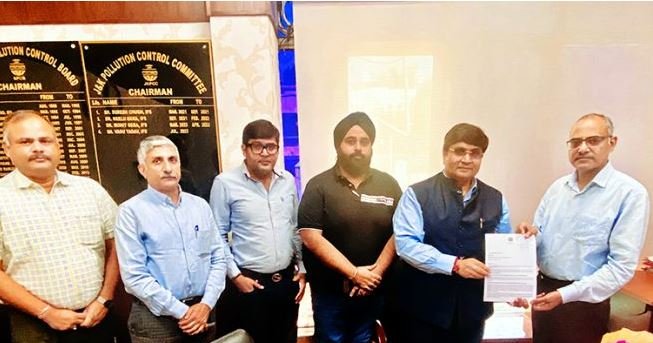JAMMU, Sept 27: A delegation from the PHD Chamber of Commerce & Industry (PHDCCI), Jammu Chapter, led by Chairman Rahul Sahai, along with Co-Chairpersons Raj Dua and Ashish Jain, and senior members Kuldeep Gupta and Vinod Gupta, held a meeting with Vasu Yadav, Chairman of the J&K State Pollution Control Committee (SPCB). The purpose of the meeting was to discuss and present pressing concerns faced by the industrial sector in Jammu, focusing on ensuring smoother regulatory processes and addressing industry-specific challenges.
One of the major topics of discussion revolved around the National Central Sector Scheme (NCSS) package, with the delegation emphasizing the need for expedited clearance of pending Consent to Establish (CTE) cases under the NCSS 2021 Central package. The delegation urged that swift action be taken to prevent any industrial units from missing the critical registration deadline of September 30, 2024.
Rahul Sahai highlighted the difficulties faced by industrial units operating diesel generator (D.G.) sets above 800 KW capacity. Currently, regulations mandate the retrofitting of emission control devices in these units. However, the Central Pollution Control Board (CPCB) restricts retrofitting to engines with capacities up to 800 KW, causing concerns among businesses. Sahai requested the J&K SPCB to provide clear guidelines to ensure the smooth processing of consents for such units, allowing industries to comply without unnecessary delays or confusion.
Another key issue raised by Sahai was related to warehouses, particularly those serving as fulfillment centers for consumer goods. He questioned the need for stringent consent requirements for these warehouses, which do not generate pollution, stressing that imposing such regulatory measures would burden businesses with unnecessary compliance costs. Such policies, he noted, would contradict the government’s Ease of Doing Business initiative, which aims to streamline processes for industries. He further emphasized the need for a clear distinction between polluting and non-polluting industries to avoid imposing unfair regulations on businesses like warehouses that have minimal environmental impact.
Sahai also addressed concerns about the potential reclassification of warehouses from the White category to the Green category. This change could lead to additional operational costs and complexities for businesses that do not contribute to pollution. He urged the SPCB to reconsider this shift, as it could hamper the growth of industries, particularly small enterprises. Additionally, he called for a time-bound resolution of consent-related cases affecting small industries, such as single-owner sawmills, many of which struggle with operational difficulties due to bureaucratic delays.
Throughout the meeting, Sahai expressed optimism that the J&K SPCB would take prompt action to address these critical industrial concerns and facilitate smoother business operations for the industrial sector in Jammu.
Responding to the concerns raised by the PHDCCI delegation, Vasu Yadav, Chairman of the J&K SPCB, assured the representatives that their issues would be given due consideration. He also highlighted the importance of regular interactions between the industrial community and the SPCB, noting that such dialogues are essential for addressing emerging challenges and ensuring that industrial growth remains aligned with environmental regulations.
Yadav emphasized that the J&K SPCB is committed to resolving these matters in a timely and transparent manner, ensuring a supportive regulatory environment for both existing and new industries.




